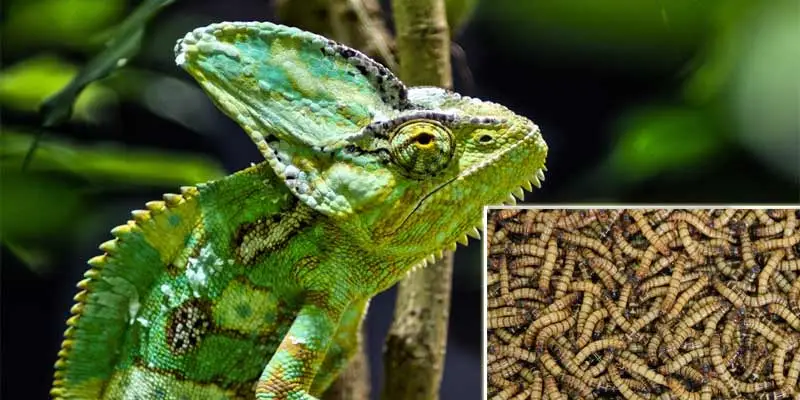Chameleons are one of the most interesting reptiles in the world. They’re known for their incredible camouflage skills and ability to change color. This reptile can eat a range of different food. Would superworms be one of the foods that chameleons can eat?
Table of Contents
Can Chameleons Eat Superworms?
Yes, chameleons can eat superworms. They are a good source of protein, calcium, and vitamin B12. They also contain calcium, which is important to prevent metabolic bone disease.
Are There Any Health Risks Involved with Adding Superworms to My Chameleon’s Diet?
The most important thing to keep in mind when adding superworms to your chameleon’s diet is that they are high in fat, which means that you should only offer them as a treat. This can be especially problematic for male chameleons because of their tendency to become obese and develop heart problems.
The calcium content of superworms may also cause kidney stones, which will ultimately lead to death if left untreated.
If you do choose to give them an occasional treat like this one though, make sure that their overall diet remains balanced so they don’t suffer from any health risks later on down the road!
Can Baby Chameleons Eat Superworms?
No, the superworm is far too big for a baby chameleon to eat, and feeding it to your young chameleon will likely lead to the worm getting stuck in its throat or digestive tract.
Instead, you can feed your baby chameleon crickets or other small insects that they are able to consume easily. As they mature into adulthood, you can begin feeding them larger prey such as superworms.
How Many Superworms to Feed a Chameleon?
You should feed your chameleon a small amount of superworms every other day. If you feed them too much, they will become overweight and unhealthy. If you don’t provide enough food for your chameleon, it will not receive the nutrients it needs to stay healthy.
What are the Health Benefits of Superworms for My Chameleon?
Superworms are high in protein and high in calcium, which is an important nutrients for chameleons. If you’re wondering what the health benefits of superworms for your chameleon are, here’s a list:
-
High Protein Content – Superworms contain around 40% protein on average, so they’re great for providing your reptile with this nutrient.
-
High Calcium Content – Superworms also have a lot of calcium in them (around 20%). Remember that calcium is essential for building bones, developing eggshells, making muscles work properly, etc., so it’s good to make sure your pet gets enough within its diet!
-
Vitamin A – Another benefit of feeding your animal superworms is that they contain lots of vitamin A. This can help prevent eye problems and improve immune system function too!
How To Feed Superworms To Chameleons
There are many ways to feed superworms to chameleons. Some people feed their chameleons live superworms, while others prefer to freeze them and then thaw them out before feeding.
Feeding live superworms is the most natural way to feed your chameleon, but it also means that you have more control over how much it eats, and this can be especially important if you’re trying to get your pet on a specific diet.
Feeding frozen superworms can be a good alternative if you don’t want to handle live ones, or if they’re not available where you live. It’s also faster than feeding live food because you don’t need to wait for it to thaw out before feeding it to your pet.
Can You Feed Dead Superworm To Chameleon?
I don’t recommend feeding dead superworms to your chameleons. The most obvious reason is that it could contain harmful bacteria and parasites.
Feeding them dead superworms increases the risk of your chameleon becoming sick. When your chameleon is ill, it can be costly for the medicine and taking them to the vet.
Conclusion
Feeding your chameleon superworms is an excellent way to provide a balanced and nutritious diet. As long as you are choosing high-quality superworms, you shouldn’t have to worry about your chameleon getting sick from eating them.

